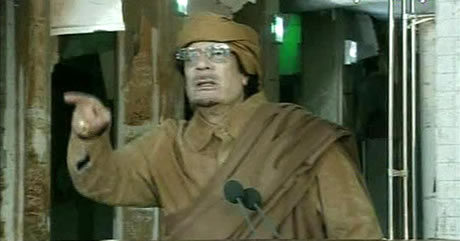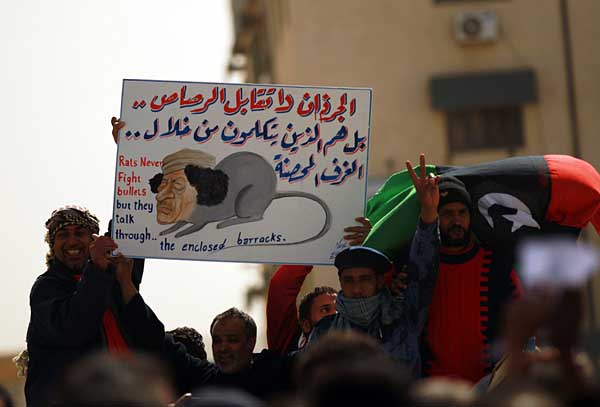Subscribe to ShahidulNews
![]()
by rahnuma ahmed

Colonel Muammar Gaddafi’s forty one-year reign has witnessed phenomenal shifts, after coming to power through a military coup in 1969, his anti-imperialist position?expressed through lending political and material support to various national liberation movements around the world (the Palestinian cause, alleged connection to the killing of Israeli athletes in 1972 Munich Olympics)?gradually gave way to embracing neo-liberalism toward the end of the last century.
In other words, from being a “terrorist rogue state” Gaddafi’s Libya became a “neoliberal client.” (Peter Boyle, Libya: How Gaddafi became a Western-backed dictator, Mathaba, 26.2.2011). ?The first had led to economic sanctions, to bombing raids ordered by US president Ronald Reagan aimed at assassinating Gaddafi. He survived. Those who didn’t are: his 15-month old adopted daughter, 45 Libyan soldiers and government officials, 15 civilians.
The second led to the development of close and personal friendship with many western leaders. Tony Blair’s relationship with Gaddafi was described by the latter’s son Saif, as being “excellent.” He has come to Libya many, many times. He stays with my father (Daily Mail, June 2010). ?While Italian prime minister Silvio Berlusconi’s relationship was described by some as a “slavish courtship” (Flavia Krause-Jackson, Berlusconi’s `Slavish’ Courtship of Qaddafi Haunts Italy, Bloomberg, February 23, 2011). ?In June 2009, Berloscuni shut down Rome’s biggest park to allow Gaddafi and his entourage of all-female bodyguards to set up camp. Beside Libya’s investment in Italian companies (Fiat SpA, UniCredit SpA, Juventus soccer team), beside Italy’s reliance on Libya for a quarter of its crude oil, Italy, according to the European Union’s latest annual report on arms export (2009), tops the list in Libya’s military suppliers in Europe, worth 112 million euros. Britain ranks fifth with 25.5 million euros (Report exposes Italy and Malta as top EU arms exporters to Libya, Deutsche Presse-Agentur, February 23, 2011).
Was it this, Italy’s business ties with Libya, which led Berloscuni to not call Gaddafi after 4 days of protests? To say that he did not want to “disturb” Gaddafi?
David Cameron, British prime minister, however, was critical of his predecessor’s relationship with Gaddafi. It had been “too close.” It did not have “clear parameters.” These “should have been in place” when the relationship began (James Kirkup, Libya: Tony Blair ‘too close’ to Gaddafi regime, David Cameron claims, The Telegraph, 23 Feb 2011).
Interestingly, what bothers Cameron is the “personal” aspect of the relationship, not the business side. And how could it, for after all, Cameron was speaking while heading what has been described as an “arms delegation” (instead of a prime ministerial visit) to four Middle Eastern countries, Egypt, Kuwait, Qatar, Oman, 21-25 February. His entourage included heads of BAE Systems, Thales UK and QinetiQ (Cameron under fire for heading Middle East arms delegation, Channel 4 News, 22 February 2011).
But pitching British arms to Middle Eastern rulers while simultaneously visiting Tahreer Square in Egypt, meeting figures from the pro-democracy movement which ousted Hosni Mubarak, must not have been easy for Cameron. When asked by a BBC reporter in Kuwait city, how can Britain claim to be committed to promoting democratic values while selling military kits to regimes which deny people their basic rights, Cameron is said to have replied peevishly ?I simply don?t understand how you can?t understand that democracies have a right to defend themselves” (James Kirkup, David Cameron sells guns, democracy and Britain, The Telegraph, 26 Feb 2011).
Cameron’s visit was “morally obscene,” it was blatantly opportunistic, says Caroline Lucas, British Green MP. Commendable but naive, for she had added, I had believed he was there to “express solidarity with the pro-democracy movement” (BBC, February 25, 2011).
A news report reveals, after relations between Libya and Britain had warmed up, officers frequently travelled to Tripoli between 2008 and 2009 to train police; that the British government authorised the export of tear gas, crowd-control ammunition, small-arms ammunition and door-breaching projectile launchers; 3 years later, vehicles armed with water cannons. Unconfirmed reports say, riot vans present during crackdowns in Benghazi where scores were killed, were made by British companies (Independent, February 19, 2011).
According to another report, one of the murderous special battalions, which is headed by another Gaddafi son Khamis, is “a British-trained unit” (Tarek El-Tablawy, Gadhafi’s hold on power is suddenly under threat, Associated Press, February 21, 2011).?Readers may be forgiven for being reminded of the British training members of the Rapid Action Battalion (RAB), Bangladesh’s paramilitary force, described as a “government death squad” by Human Rights Watch (RAB, counter-terrorism and pursuit of democracy, New Age, December 30, 2010).
Libya’s oil exports have helped it build up foreign reserves of $150 billion, but nearly half of the population fall outside the oil-driven economy. Despite being the richest North African country, youth unemployment is the highest in North Africa, 40-50%. Although the political revolution of 1969 did lead to the nationalisation of Libya’s oil industry, and broader redistribution of wealth as compared to Saudi Arabia, little of Libya’s petrodollars have been invested in the welfare of Libya’s 6.5 million inhabitants. Education levels are lower than neighbouring Tunisia which, by the way, does not have oil. Decent housing is unavailable for the disadvantaged half who struggle to make ends meet since prices are generally high. The key to popular discontent is the “the lack of work opportunities, which strongly contrasts the Libyan image of a rich nation constantly propagated by the regime and its Soviet-style media.” For ordinary Libyans, work opportunities include the police, armed forces, construction work and petty trade but contacts and corruption stand in the way of these opportunities (African Online News). ?The oil sector employs only 4,900 Libyans, with a further 1,000 training overseas (Libyan National Oil Company, October 2010 report). The regime claims to have provided free health and education for all citizens, in reality, “quality and access was not even.” Workers were provided with some welfare, but not with trade unions. Significant numbers of “guest workers” were treated unfairly, being closed off in “labour camps.” And, for us, news headlines such as these were not uncommon: “Bangladeshi workers cheated in Libya. 46 left with no jobs or salaries for 6 months” (The Daily Star, January 9, 2010).
The regime born of the 1969 revolution, writes Boyle, has degenerated into “crony capitalism.” The bizarre personality cult around Gaddafi, a pretence at popular democracy through “people’s congresses,” stifling political repression?particularly in the eastern part which is richest in oil but the poorest, also, the first to be liberated from Gaddafi’s rule?corruption, nepotism, flamboyant lifestyles enjoyed overseas by Gaddafi’s children, and the inspiring examples of the youth of Tunisia, Egypt, Bahrain, Algeria, Yemen, Syria, Jordan and Djibouti have added the spark which has ignited fires of discontent that have spread rapidly all over Libya, despite Gaddafi’s vow of crushing the protestors (dubbed, “al-Qaeda”).
Although western leaders had initially paused at news of the popular uprising in Libya (US president Barack Obama had maintained a “silence,” The Guardian, 24 February 2011), ?the prospect of military intervention in Libya is mounting. For, as the conservative German daily Die Welt writes, “The danger is in delay…What is happening on the far shore of the Mediterranean is the opportunity of a century” (Europe must issue a credible threat to Libya, Spiegel Online, February 24, 2011).
Although no evidence is publicly available to? corroborate the report, the DEBKAfile web site, associated with Israeli military intelligence, claims that ?hundreds of US, British and French military advisers, including intelligence officers, were dropped from warships and missile boats at the coastal towns of Benghazi and Tobruk Thursday Feb. 24,? (Patrick O’Connor, US and Europe step up preparations for intervention in Libya, World Socialist Web Site, 26 February 2011).
Washington, in all likelihood, is pushing for civil war in order to justify a US-NATO military intervention, writes Mahdi Darius Nazemroaya. Cloaked as a “humanitarian intervention” it will be similar to previous ones in Yugoslavia and Iraq. Its objective? To strengthen Washington/Brussels control over Libya either through regime change or civil war. The absence of a strong organised opposition movement, the inclusion of corrupt officials in the coalition opposed to Gaddafi would probably make it easier to co-opt opposition forces. If so, Libya would become an “occupied country. Its resources would be plundered and its assets privatized and controlled by foreign corporations as in the case of Iraq” (Libya: Is Washington Pushing for Civil War to Justify a US-NATO Military Intervention?, Global Research, February 26, 2011).
As prospects for western military intervention loom large, Russian prime minister Vladimir Putin warns western countries against meddling in the Arab world. The West must allow Libyans self-determination, he said.
Nazemroaya also cautions his readers about al-Jazeera. It is not a neutral actor, but subordinate to the Emir of Qatar and the Qatari government, which is also an autocracy. Its coverage of protests in Bahrain showed restraint, probably due to political ties between Qatar and Bahrain. As for its Libyan coverage, no visual evidence was presented of Libyan jets firing on protestors in Tripoli and other major cities, although other events in Libya have been visually confirmed. Similarly, Yoshie Furuhashi, appreciative of al-Jazeera’s coverage of Tunisian and Egyptian intifadas notes, the channel, in both Arabic and English, features leading members of the National Front for the Salvation of Libya, an “outfit funded by the CIA and Saudi Arabia during the Cold War.” It also gives the self-styled “Crown Prince” of Libya, Muhammad as-Senussi, a platform from which to call upon the “international community” to help remove Gaddafi from power and stop the ongoing massacre. I will support anything that stops the killing, even military intervention (paraphrased; see Al Jazeera Promotes Libya’s “Crown Prince” Who Calls for Military Intervention in Libya, Monthly Review, February 25, 2011).
As I read news of countries rushing to evacuate their citizens from Libya, “2 ships carry 3,000 Turks back home from Libya,“?”China has said it will send a jet, ships and fishing vessels from nearby waters to violence-wracked Libya on Wednesday to help evacuate more than 30,000 Chinese living there,” ?”Indian evacuation ship to arrive in Libya Sunday,” ?”Nepalese officials in Kathmandu said they were looking at plans to evacuate about 2,000 citizens,”?I think of the 60,000 Bangladeshi workers trapped in Libya. Food rations were drying up, employers had fled without paying wages, this is what they told family members over telephone, who blocked the Dhaka-Sylhet highway on Saturday, protesting against the goverment’s inadequate evacuation plans. “Evacuation is an option,” says the foreign secretary. “The Bangladesh government has put this option on the table.”
It seems to remain “on the table” for migrant workers are valued by Bangladesh’s rulers only for the remittance they provide. Not for their worth as human beings.

Published in New Age Monday February 28, 2011
Christmas toys shop…
[…]`The Opportunity of a Century.’ Western Military Intervention in Libya? | ShahidulNews[…]…